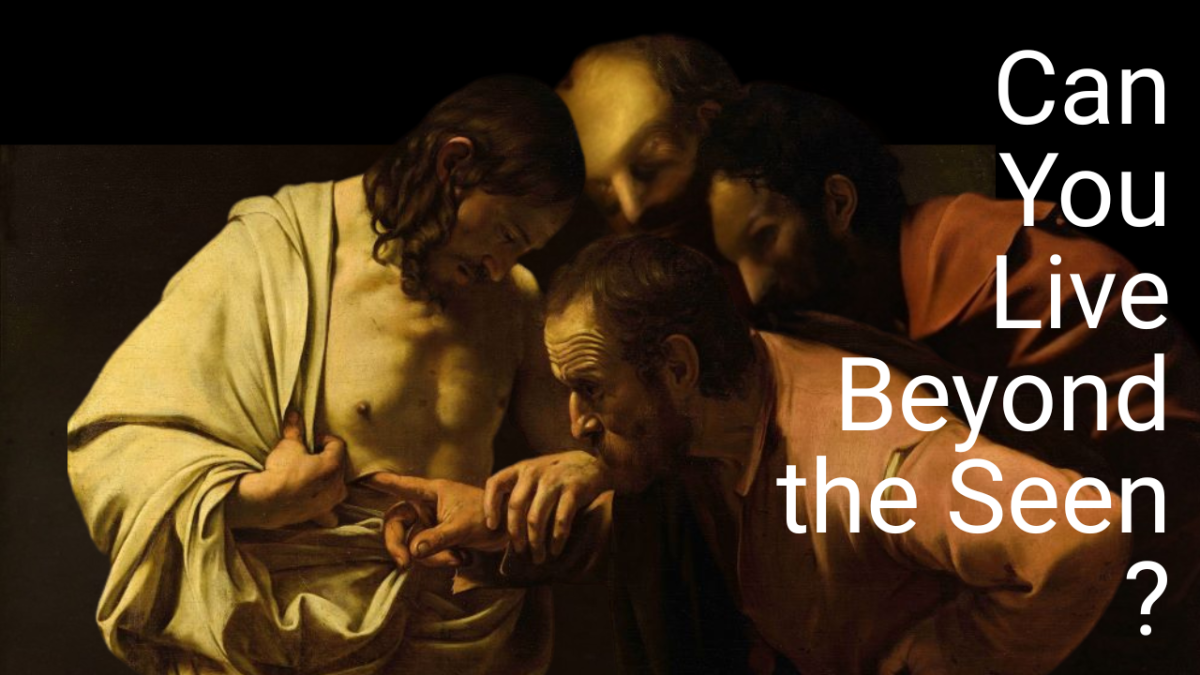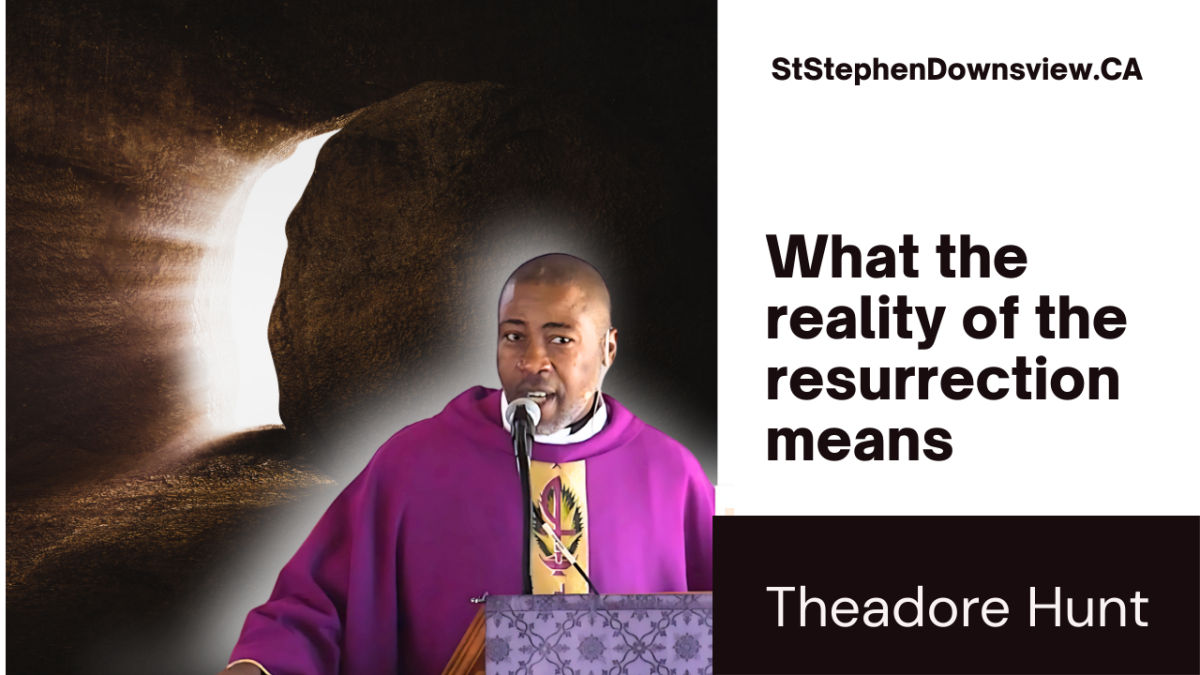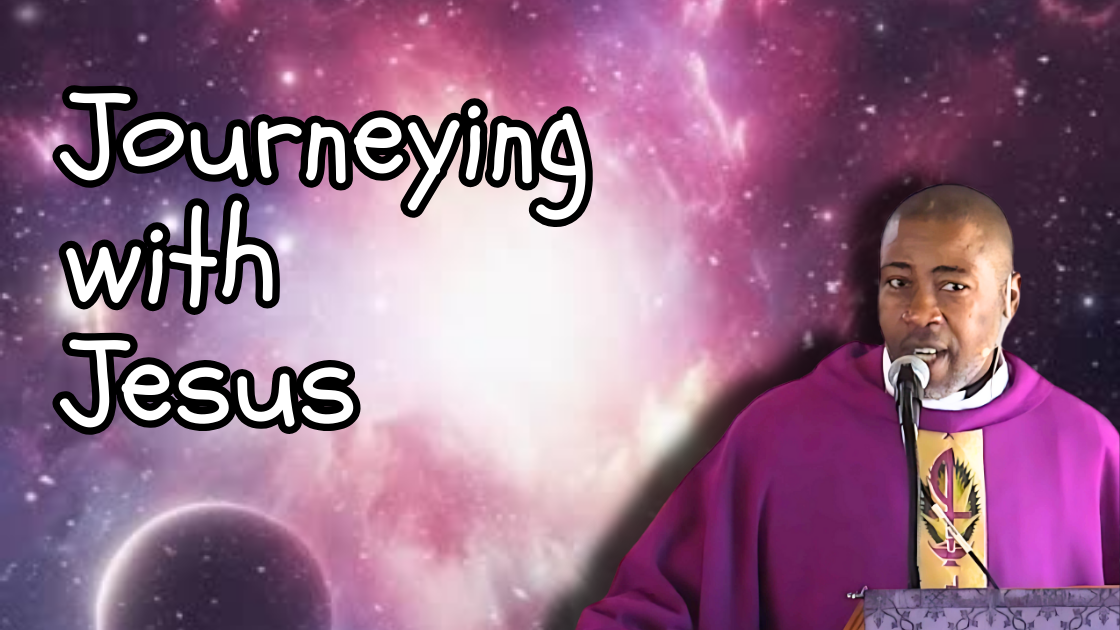Archive for April, 2025
Posted on: April 28th, 2025 by St. Stephens Downsview
 I want to share with you some profound insights from John’s Gospel, chapter 20, verse 29. Jesus said to Thomas, “Have you believed because you have seen me? Blessed are those who have not seen and yet have come to believe.” This passage opens a window into the spiritual journey from doubt to faith. Today, I invite you to explore this journey with me—a journey that challenges believers to live beyond what is immediately visible.
I want to share with you some profound insights from John’s Gospel, chapter 20, verse 29. Jesus said to Thomas, “Have you believed because you have seen me? Blessed are those who have not seen and yet have come to believe.” This passage opens a window into the spiritual journey from doubt to faith. Today, I invite you to explore this journey with me—a journey that challenges believers to live beyond what is immediately visible.
The Journey of Faith Begins
I want to begin by recounting the story of a young man whose journey in faith was ignited through a tearful conversation with a trusted Christian friend. His Christian journey, unbeknownst to him, had commenced long before this catalytic moment. Early that very day, he was moved by what he perceived to be God’s personal call: “Come and truly follow me.” That night, he found himself responding to this call on his knees. This transition from doubt to faith is one he would come to experience continuously, learning not to question whether Jesus is, indeed, Lord and God.
Thomas and His Moment of Revelation
In our Gospel reading, Thomas’s journey from doubt to faith took place over a week. Yet, like all believers, his faith was meant to grow ever more steadfast. On the evening when Christ first appeared to his disciples, Thomas was absent, doubting until he could see the evidence of Jesus’s wounds. Despite the brutality of Jesus’s death, what Thomas needed was that tangible proof, and Jesus, in His grace, provided it. Jesus met Thomas’s doubt, not out of obligation but out of mercy, to elicit faith from him.
This transformative encounter changed Thomas’s perspective forever. When Jesus appeared, not bound by locked doors, standing before him in His resurrected body, Thomas’s doubt melted into unequivocal belief, prompting his exclamation: “My Lord and my God.”
Reflecting on Our Own Journey
This journey from doubt to faith is one that speaks to many of us today. Standing with Thomas, waiting to be moved from doubt to faith, is a common position. Until we make that journey ourselves, we truly have not begun to live the resurrected life. The assurance that belief must transition from the mind to the heart is central to experiencing the life God offers abundantly.
Jesus’s words, “Blessed are those who have not seen and yet have come to believe,” carry a promise of blessing. True belief is dynamic, it involves movement and action. It’s not merely what we think but what we do with our faith that defines us.
Faith in Action
Our faith must not exist merely as a mental exercise or private belief. It is the root from which our actions stem. As James aptly puts it in his letter, faith without works is dead. True faith is demonstrated in how we live our lives daily.
This active faith points not to our capabilities, but to our confidence in God and His promises. When we recite the Apostles’ Creed, for instance, we are not merely professing words but affirming the God revealed as Father, Son, and Holy Spirit. Our confidence lies entirely in God, not ourselves.
The Call to True Belief
I urge you to contemplate whether you have embraced belief in Jesus, not just intellectually but with true conviction. The journey from doubt to faith is personal, one that requires engaging with others, absorbing wisdom, and embracing the community of believers.
Thomas teaches us to be open to the testimony of others and to receive Jesus as Lord. Through this, we receive new life and continue our journey of growing in faith and obedience.
Conclusion
Returning to the story of the young man, his faith journey marked a new chapter when the Risen Lord became real to him. It was a profound awakening to Jesus’s presence that had been with him all along. Is today the day for you to commence this journey? Or perhaps God is guiding you to share this profound journey with someone else in need.
Let us pray for guidance and strength, as we travel from doubt to faith in the light and love of the Risen Christ. Amen.
Posted on: April 20th, 2025 by St. Stephens Downsview
 Welcome, everyone. It’s so good to see all of you as we gather on this Easter Sunday to commemorate the resurrection of our Lord. I want to share some reflections from Luke’s gospel. As you’ve heard in Luke chapter 24, verses 9 to 11, we see the account of the women discovering the empty tomb and the apostles’ initial disbelief. These stories are rich with lessons for our lives today.
Welcome, everyone. It’s so good to see all of you as we gather on this Easter Sunday to commemorate the resurrection of our Lord. I want to share some reflections from Luke’s gospel. As you’ve heard in Luke chapter 24, verses 9 to 11, we see the account of the women discovering the empty tomb and the apostles’ initial disbelief. These stories are rich with lessons for our lives today.
The Realness of the Gospel
Over the years, I’ve come to appreciate the authenticity with which the resurrection accounts are told. If you pay close attention to the text, you’ll notice there are no attempts to smooth out the rough edges. The realness is evident in the disciples’ misunderstandings and in their initial disbelief. As we reflect on these accounts, we see that they aren’t just carefully crafted tales but genuine parts of our history.
The Women at the Tomb
In today’s scripture, Luke tells us about the women who went to the tomb with spices, intending to prepare Jesus’ body. Despite hearing Jesus predict his resurrection, they expected to find his body there. Their confusion when confronted with the empty tomb is a testament to the unexpected nature of the resurrection event.
The First Proclaimers of Resurrection
An interesting aspect of this narrative is the role of the women as the first bearers of the resurrection news. In a patriarchal society, their testimonies weren’t given the same weight as those of men. Yet, Luke highlights these women: Mary Magdalene, Joanna, and Mary, the mother of James. Their experience challenges our own biases and invites us to see the extraordinary roles that seemingly ordinary people play.
Questions of Belief
The apostles were slow to believe the women’s account, which the text describes as seeming to them an “idle tale.” It prompts us to question: Are we, too, sometimes unwilling to believe truths that challenge us? Do we require the resurrection to meet our own burdens of proof before we accept its implications?
Implications of the Resurrection
What we believe about the resurrection matter. It’s not simply a message to be proclaimed but an event that changed human history. It challenges us to consider Jesus not just as a historical figure but as the living Christ who continues to impact the world today.
Conclusion
In our reflections this Easter, let us embrace the complexity and authenticity of the resurrection story. May it stir within us a deeper faith and a willingness to be transformed by its reality. As we remember that Easter morning, let us carry forward the hope and new beginnings that the resurrection signifies.
Posted on: April 14th, 2025 by St. Stephens Downsview
 Good morning, everyone. Today, I welcome you to Palm Sunday as we embark on the Holy Week. As we gather, I want to share some words from Luke’s Gospel, chapter 23, verse nine: “Herod questioned Jesus at length, but Jesus gave no answer.” This Palm Sunday marks a significant moment in Jesus’s journey, his final entry into Jerusalem, which was greeted with fanfare and anticipation.
Good morning, everyone. Today, I welcome you to Palm Sunday as we embark on the Holy Week. As we gather, I want to share some words from Luke’s Gospel, chapter 23, verse nine: “Herod questioned Jesus at length, but Jesus gave no answer.” This Palm Sunday marks a significant moment in Jesus’s journey, his final entry into Jerusalem, which was greeted with fanfare and anticipation.
The Contrasting Crowds
Many who followed Jesus believed this would be the moment he overthrew the Roman authorities to liberate God’s people. Others hoped for a miraculous sign proving his Messiahship. But what began with triumphant cries of “Hosanna” quickly turned into shouts of “Crucify him.” Jesus faced a sham trial, His innocence acknowledged by Pilate and Herod, yet succumbed to the crowd’s will. Even then, Jesus took the place of the guilty, exemplifying his sacrifice.
Zooming Out: Understanding the Bigger Picture
Let us take a moment to step back and comprehend the larger narrative at play. In doing so, we gain clarity on what it means to journey with Jesus in his suffering. The incarnation—God taking human form—was for our reconciliation. Jesus, in humble obedience, embraced suffering and death. Paul’s letter to the Philippians beautifully encapsulates this: Jesus was obedient to the point of death, even death on a cross.
The Courage to Endure
We often say, “I’ll do it, even if it kills me,” expressing determination. Yet, rarely do we expect true peril. For Jesus, this was literal. His determination demonstrates true courage—doing what’s right, even at a great cost. Through this, we learn that God’s boundless love pursued our salvation despite suffering.
Silent Witness: Endurance and Persecution
Jesus’s silence in the face of false accusations stands as a profound witness. He did not retaliate but let his life testify to God’s truth. This silence invites us to a deeper faith; it’s not about refraining from words but about trusting God’s justice and embracing his will, even amidst suffering.
The Call to Obedience
This obedience isn’t learned in moments of trial but cultivated throughout our Christian walk. Through Jesus’s teachings, such as in the Sermon on the Mount, we understand the blessing in persevering through persecution. Jesus’s journey from Palm Sunday to Easter reflects meekness, not weakness—a deference to God’s will.
Reflecting on Our Journey
As we reflect, I encourage each of us to examine how our lives mirror the obedience of Jesus. In daily choices, are we willing to take up the cross of obedience, even if it means personal sacrifice? Navigating this world, remaining true to Christ’s teachings is challenging, yet essential.
An Encouragement for Believers
I conclude with encouragement from the letter to the Hebrews, reminding us to consider the endurance of Jesus. In our struggles against sin, the discipline of the Lord teaches us. As children of God, carrying the palm crosses we receive today symbolizes our allegiance and journey with Jesus. Let us mindfully carry this symbol from now until the next season of Lent.
Posted on: April 6th, 2025 by St. Stephens Downsview
Introduction
 Let us begin with a moment of reflection. It’s good to see you all again this morning as we gather on this fifth Sunday in Lent. Today, we’re diving into a passage from John’s Gospel, chapter 12, where we encounter a profound message hidden within a familiar scene.
Let us begin with a moment of reflection. It’s good to see you all again this morning as we gather on this fifth Sunday in Lent. Today, we’re diving into a passage from John’s Gospel, chapter 12, where we encounter a profound message hidden within a familiar scene.
Understanding the Elephant in the Room
Many of us are familiar with the phrase "the elephant in the room." It’s a metaphorical expression that suggests the presence of a significant, often awkward topic everyone knows about, yet no one addresses. Whether it’s in politics or personal relationships, such elephants often remain unspoken due to discomfort or fear.
In today’s Gospel, John sets the scene in Bethany. Jesus is dining with his friends, including Mary, Martha, and Lazarus—Lazarus, who was raised from the dead, now sitting at the table with Jesus. A scene that might go unnoticed unless we confront the elephant present.
The Significance of Jesus Dining with Lazarus
The unusual scene of Jesus sharing a meal with a man who once was dead serves as our elephant. It’s not just that Lazarus was resurrected; it’s what this act signifies about Jesus’s identity and the divine work of God. It demonstrates that death is not the final word and offers a tangible testament to the renewal and redemption God offers.
The Call to Believe in a New Reality
Jesus’s claim, "I am the resurrection and the life," challenges perceptions of both life and death. It’s a radical invitation to believe in His power, not as a distant future promise but as a present reality. This meal with Lazarus foreshadows the promise that through Him, even death cannot separate us from God’s love.
Mary’s Act of Worship and Recognition
Amidst this profound revelation, Mary acknowledges God’s presence through an extravagant act of worship. Anointing Jesus’s feet with costly perfume, she not only expresses gratitude but also proclaims the magnificent grace of God at work, echoing through the fragrance that filled the house.
Confronting the Elephant in Our Lives
As we navigate our lives, are we willing to confront the elephants, recognize God’s work, and respond like Mary? We mustn’t ignore the divine presence in our midst, lest we be overcome by the very truths we avoid.
Conclusion
In this season of Lent, I urge us to embrace the courage to address the divine elephant, to take up our cross, and follow Jesus. May we be transformed by His presence and may our lives reflect the extravagance of His grace.
Let Us Pray
Creator God, you pave a new path in the wilderness, watering the deserts of our lives. Help us see your hand in all things and open our hearts to be transformed by your renewing grace. May we proclaim your work through our lives, now and forever. Amen.
 I want to share with you some profound insights from John’s Gospel, chapter 20, verse 29. Jesus said to Thomas, “Have you believed because you have seen me? Blessed are those who have not seen and yet have come to believe.” This passage opens a window into the spiritual journey from doubt to faith. Today, I invite you to explore this journey with me—a journey that challenges believers to live beyond what is immediately visible.
I want to share with you some profound insights from John’s Gospel, chapter 20, verse 29. Jesus said to Thomas, “Have you believed because you have seen me? Blessed are those who have not seen and yet have come to believe.” This passage opens a window into the spiritual journey from doubt to faith. Today, I invite you to explore this journey with me—a journey that challenges believers to live beyond what is immediately visible.


